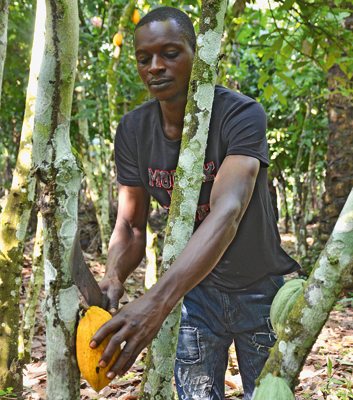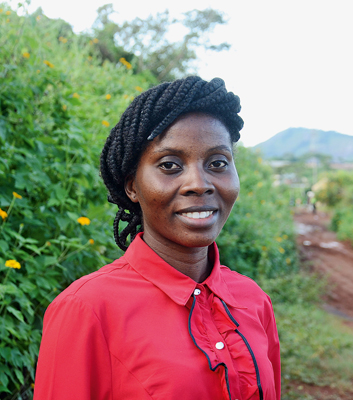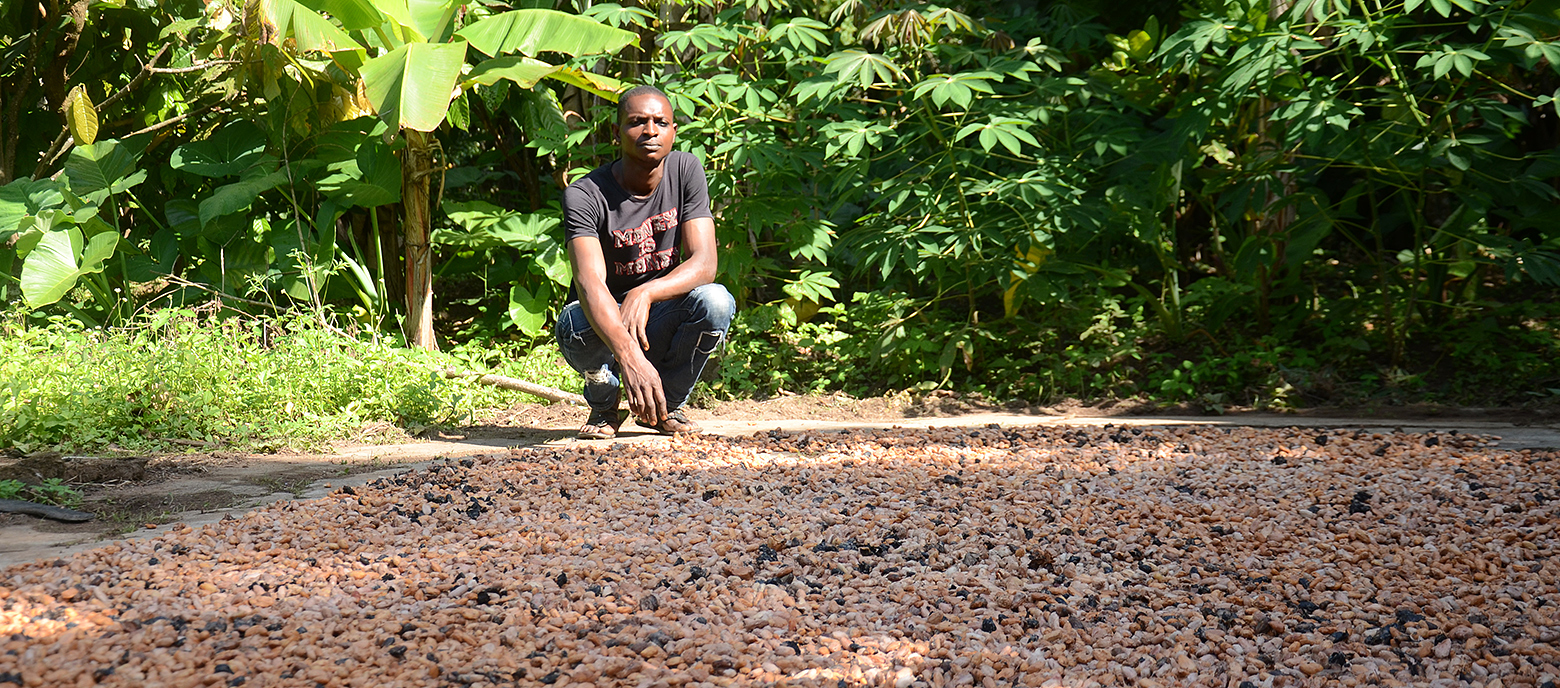cocoa farming
A promising harvest
‘As a child I spent a lot of time in my father’s fields and his woodland. I usually went to find him as soon as school finished. Even back then he was growing cocoa. It was always taken for granted that I would run the farm when he was no longer with us. My brothers and sisters have also become farmers. Until I went to a Farmer Business School in 2014, I learned everything from my father. At the school, I realised how important it is to build a strong foundation of knowledge.

I learned a lot, and I started to plant new cocoa trees regularly and cut back the old ones. There are only two or three fruits on those old trees, and the yield is around 300 kilograms per hectare. I plan to replace them gradually using hybrid varieties. These are bred by crossing two high-yielding parents. The idea is that the offspring inherit their positive characteristics. The first of these new plants are already bursting with fruit, so I expect to double the crop. I have also learned how important it is to leave the correct distance between each tree and why it makes sense to grow other crops as well as cocoa. I have planted manioc, kola trees and oil palms. Step by step I am transforming the land into a modern business. My wife and I have invested our initial profits in the future of our four children, who are aged between one and 15. We want them to have a good education. We decided to send them to private schools. That costs 126,000 naira (around EUR 300) a year. Over half of that goes on my eldest daughter's school fees. Without the Farmer Business School, we would not have been able to make that important investment.’ —
“Without knowledge, farmers can end up paying a heavy price.”

‘I studied agricultural sciences because I like being outdoors. It also means I get to work with farmers. No country can survive without food, and that all comes from farming businesses. Unfortunately, my studies at the Federal University of Technology in Akure in south-western Nigeria were very theoretical. After graduating, I was unemployed for a while. Then, in 2017, I got a place on a government programme for young academics called N-Power Agro. Together with seven other students from Ondo State, I qualified as a trainer for the Farmer Business Schools. We learned how to teach farmers about cultivation methods, business skills and healthy eating for the whole family. To begin with, I just sat in the classroom and observed experienced trainers. Now I work as a teacher myself. I really enjoy it. I’m more confident and I’m better at communicating. I’ve also learned how important adult education is in Nigeria and how to teach adults. There are lots of things farmers need to know so that they can grow high-quality products. Without that knowledge, they can end up paying a heavy price – poor crops, for example. At the same time, I learn from the farmers. I see myself as a facilitator, helping people to exchange knowledge, rather than as a normal teacher. My future career will involve advising farmers. There are 18 local government areas in Ondo State, but only 11 of them have a Farmer Business School. So there is still a lot to do.’ —
“We aim to reduce the amount of chemicals we use by working more precisely.”

‘The Farmer Business School helped us to understand that as farmers we are stronger and can achieve more if we join forces. Over the last few years, six cooperatives have been set up in our village, Kajola in western Nigeria. Each one has between 30 and 35 members. In 2016, we decided to open an agro-shop, and we set up a committee. I am the chairperson. I am in the shop every day between 8 and 10 o’clock in the morning and again between 4 and 6 o’clock in the afternoon. I sell fertiliser and products to help farmers protect their plants. It’s much easier for farmers now. Before we opened the shop, they had to travel all the way to Akure or Ado-Ekiti, the provincial capitals, to buy these things. The roads are poor, and the journey takes over two hours. The shop saves them a lot of time and above all money. We arrange transport together, and because we can buy what we need in larger quantities we can sell it more cheaply, too. One of the products we sell is used to prevent black rot, a fungal disease that can cause a great deal of damage. If a fruit is attacked by the disease, it gradually turns black. We sell the black rot treatment for 5,200 naira (EUR 12.50). That’s 400 or 500 naira less than it costs elsewhere. However, the farmers don’t end up using more fertiliser and pesticides just because they can buy it at the agro-shop. In fact, the opposite is true. We have learned to measure out our land precisely and prune our trees. That means we can use exactly the right amount of fertiliser. I can tell you from my own experience as a cocoa grower. By working more precisely I use fewer chemicals. That allows us to produce more and better-quality cocoa.’ —
“Nowadays, farmers can offer services as well.”

‘I work for the Agricultural Development Programme run by the Ministry of Agriculture in Ekiti State. In 2013, I was chosen to attend a course for agricultural trainers. To begin with, I was sceptical, because I had already attended several courses. This time, however, I quickly realised that the course was different. It was very wide-ranging and challenging. It lasted nearly three weeks. As well as attending lessons, we had to solve group tasks and submit exercises. On several occasions, I had to carry on working until one o’clock at night. Since the end of the course, I have trained 320 female farmers and 621 male farmers on three different programmes. The atmosphere is friendly. Sometimes I’m asked for advice on personal matters, too. What I particularly like is seeing people come up with their own ideas once they complete the training. To give you an example, one group in the village of Kajola set up a small mill to process their palm oil fruit. We encourage farmers to grow other crops as well as cocoa. That creates new agricultural markets, and it means that cooperatives can offer services as well – large-scale pest eradication, for example, or advising other farmers. Even I have improved my budgeting system. I never used to bother keeping accounts, but now I keep a careful record of my income and expenditure. That way I have been able to set up my own manioc and maize farm. I used my first profits to buy a car. It’s not a luxury, though. It makes it easier for me to deliver training courses in more remote villages.’ —
Finding ways out of desperate poverty
Western and central Africa produce over 70 per cent of all the world’s cocoa. Also known as ‘brown gold’, cocoa is the most important source of income for over two million smallholders. However, world market prices fluctuate considerably and have dropped from USD 5,000 per metric ton in 1980 to around USD 2,300 in early 2019. For smallholders that is barely enough to survive on. On average, they have to live off less than USD 2 per person per day. A programme entitled Sustainable Smallholder Agri-Business in Cameroon, Côte d’Ivoire, Ghana, Nigeria and Togo has paved the way for one possible route out of poverty. GIZ has been commissioned by the German Federal Ministry for Economic Cooperation and Development to implement the initiative together with over 50 international and local partners in Africa. Farmer Business Schools (FBS) are at the heart of the programme. The schools teach farmers how to produce cocoa and other basic foods more efficiently. In turn, this enables them to earn more money from their crops. The programme’s business service centres can supply seeds, fertiliser, herbicides, pesticides and expert advice, as well as putting farmers in touch with lenders and providing market information. Farmers also learn how to generate other sources of income. The lessons learned are put to good use in 21 other German development cooperation programmes in Africa. The take-up has been impressive, and in 2018 a pan-African master trainer programme was launched to meet the demand for FBS courses. —
Contact: Annemarie Matthess, annemarie.matthess@giz.de
www.ssab-africa.net
THE PROJECT IN FIGURES
1.1 million smallholders in 19 African countries have completed a training course with the Farmer Business School programme. One third of the 300,000 FBS trainees in Nigeria were women.
published in akzente 1/19

